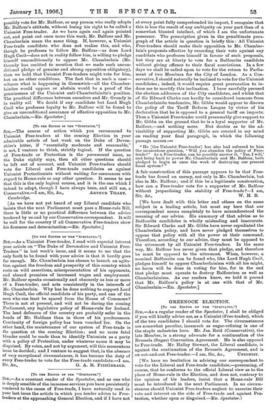LETTERS TO THE EDITOR.
THE DUTY OF UNIONIST FREE-TRADERS AT THE POLLS.
[TO TUN EDITOR OF THE "SPROTATOR."I
SrR,—I note with great regret the advice to Free-trade Unionists which you give in your issue of the 6th inst. You write (p. 5): " If a candidate will declare himself fairly and honourably against Chamberlainism, we do not ask him to make any confession of faith in regard to Mr. Balfour's policy, but leave that entirely aside." And you add : " Surely this is going very far in the direction of corn- promise."
What is Mr. Balfour's policy P The Duke of Devonshire says he does not know what it is yet. Mr. Chamberlain says that Retaliation is valueless without Protection,—which is understandable. I have not yet seen any attempt on the part of Mr. Balfour to bring down his policy from the clouds and harness it to existing conditions. It may be a negligible policy, but in my opinion there is great danger in leaving it aside. What is there to prevent it developing on the only lines that are applicable, and ultimately reaching its logical conclusion,—Protection P His declared policy would cover that result. If he were returned to power, he could after a few months say : "I have tried Retaliation, but it has at present no sanction. I must back it up by a 2s. duty on corn, and a 10 per cent. duty on manufactured goods." He could out-Chamberlain Mr. Chamberlain, and put a tax on bacon and maize in order to fortify the Retaliatory pistol. I submit there can be no compromise on so vital a question. The issue must be fought out, and no quarter given or asked for. As you have frequently remarked, the more emphatic the victory of Free-trade the sooner we shall be able to support our own party again.
I also regret to note your remarks as to abstention from voting. At this juncture I submit that no political circum- stances would justify a Unionist Free-trader not exercising the privilege of voting. It is his duty to vote against Protec- tion or Retaliation, and this even if the Liberal candidate were pledged to the hilt in favour• of Home-rule. The Union is secondary to Free-trade (if a choice must be made between the two); and if it were not, the House of Lords would, as you point out, again refer Home-rule to the electors. Conservative and Unionist Free-traders should have only one question before them at this Election, and they should close their eyes to those questions in the Liberal programme to which they object. As we must vote against our party, let us do it well.
[We have never said or suggested that Mr. Balfour has given, or could or would give, any pledge to oppose the Chamberlain policy, because we are certain that he would do no such thing. Therefore no Unionist Free-trader could
possibly vote for Mr. Balfour, or any person who really adopts Mr. Balfour's attitude, without losing his right to be called a Unionist Free-trader. As we have again and again pointed out, and point out once more this week, Mr. Balfour and Mr. Chamberlain mean the same thing. If, however, a Unionist Free-trade candidate who does not realise this, and who, though he professes to 'follow Mr. Balfour—as does Lord Hugh Cecil—does not in reality follow him, is willing to pledge himself unconditionally to oppose Mr. Chamberlain (Mr. Grundy has omitted to mention that we made such uncon- ditional pledge of genuine and strong opposition obligatory), then we hold that Unionist Free-traders might vote for him, but on no other conditions. The fact that in such a case— witness what is happening in Greenwich—all the Chamber- lainites would oppose or abstain would be a proof of the genuineness of the Unionist anti-Chamberlainite's position. The practical difference between ourselves and Mr. Grundy is in reality nil. We doubt if any candidate but Lord Hugh Cecil who professes loyalty to Mr. Balfour will be found to give an unconditional assurance of effective opposition to Mr. Chamberlain.—ED. Spectator.]











































 Previous page
Previous page